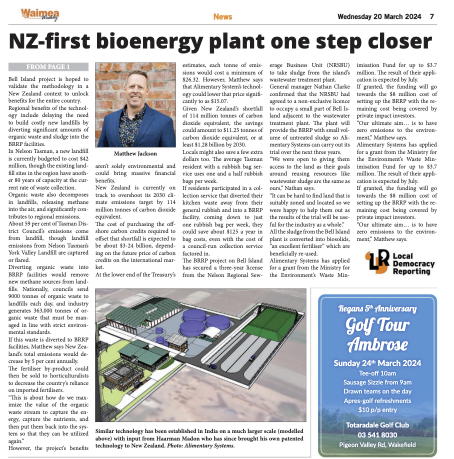In his eye-opening article and video documentary, "Our water infra is in the poo," John Campbell pulls back the curtain on the state of New Zealand's water infrastructure. The revelations may lead us to a disheartening view of our water systems. Yet, at Alimentary Systems, we believe in highlighting problems and forging solutions.
Our journey towards addressing New Zealand's water woes is guided by a holistic framework that marries Technology, Policy, and Finance. This trifecta forms the backbone of our proposed solution, which seeks to answer two critical questions posed by Campbell: Can we manage local water effectively, and how will we fund these initiatives?
The Technological Frontier
Our approach to technology focuses on refining water treatment processes. In many provincial areas, settling ponds have been the norm, but their output is often inconsistent. We propose a strategy of consolidation across councils to benefit from economies of scale, which would facilitate significant upgrades. Moreover, we advocate for:
Separating Grey and Black Water: This move towards separating different types of wastewater can make treatment plants smaller, more affordable, and more efficient.
Organic Waste Stream Consolidation: By combining organic waste streams, smaller councils can avoid infrastructure duplication, which leads to better energy recovery and reduced operational costs.
Incorporating Automation and IoT: Smart systems could revolutionize asset management, offering real-time insights into operations and opening the door to innovative funding mechanisms like carbon credits.
Policy Reforms
New Zealand's current water management framework lacks specific key policies. Our recommendations include establishing a uniform wastewater standard and biosolids management guidelines. Moreover, separating wastewater streams and encouraging industries to treat their effluent can ensure a more sustainable approach. By modernising assets to treat organic wastes, we can also tap into the potential of carbon credits.
Financial Strategies
Resource recovery is the cornerstone of our financial strategy. By focusing on extracting value from energy, nutrients, and carbon credits, we can significantly offset the costs associated with building new infrastructure. This approach promises a reduction in lifecycle expenses and positions us to capitalize on the revenue potential of sustainable practices.
Energy: Leveraging technology for better energy efficiency and recovery, aiming for systems that produce more energy than they consume.
Nutrients: Implementing guidelines for biosolids management to turn treated waste into valuable organic fertilizers, reducing the need for synthetic options and mitigating runoff risks.
Carbon Credits: Harnessing engineering methodologies approved by the UNFCCC to generate substantial revenue, which can then be reinvested into our water infrastructure.
A Sustainable Future in Sight
At Alimentary Systems, we're optimistic about crafting a viable and sustainable solution for Aotearoa. Our focus extends beyond wastewater to encompass the broader context of water abundance in New Zealand. The country's significant freshwater resources and challenges, like livestock waste and fertiliser runoff, necessitate a shift towards preventative measures.
As we explore these solutions, we invite open dialogue and collaboration. Our goal is to ensure that water management in New Zealand can be done not just well but excellently, meeting the needs of both our communities and the environment. The path forward is clear: through innovation, policy reform, and strategic financing, we can secure the health of New Zealand's water systems for generations to come, as we aim to prove in Nelson.
